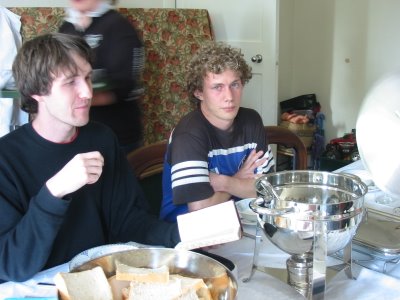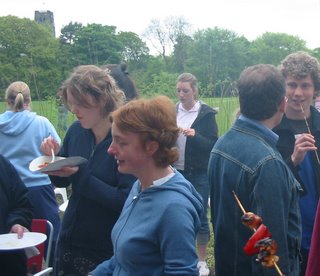Wednesday, May 31, 2006
Chilled out Crazy
While driving down today I caught Jo Whiley interviewing Nelly Furtado on Radio 1. The interview was dull, but her cover of Gnarls Barkley's Crazy is worth a listen!
Tuesday, May 30, 2006
Words for Life
Further to a conversation last night, the Wycliffe Words for Life magazine has some fascinating stories about using spoken translations to provide God's Word to communities with a strong oral tradition... I'm sure Seymour will be pleased to hear this!
Wycliffe are also adamant about the need for Scripture translation in a community's native language - but this is something I'm sure we all agreed on anyway!
Wycliffe are also adamant about the need for Scripture translation in a community's native language - but this is something I'm sure we all agreed on anyway!
Labels:
Bible
Gapminder
Gapminder is a new acquisition for Google Tools, a brilliantly executed interactive graph "visualising world development".
Well worth a look!
Well worth a look!
Friday, May 26, 2006
Why you should sit still in church
Dave read me this excerpt from The Sacred Diary of Adrian Plass (aged 37 3/4) last week and it made me laugh out loud! I haven't met any Doreen Cooks in Kings yet, but the near-familiarity of this story made it all the funnier!
Sunday December 15th
Our church is getting like an auction room. One blink and you get ministered to. Sit still and keep your eyes shining - that's my motto. This morning was Edwin Burlesford's fault. Forty-five minutes on 'sin'! A record nine-fruit-gum talk. Halfway through, I was checking supplies when Edwin suddenly shouted 'LUST!', and made me drop the packet under my chair. Put my head down between my knees to locate it, then couldn't get up because Doreen Cook pressed her hands down on the back of my head. She prayed that 'our despairing brother would move from darknes to light'. I was all for that - I couldn't see a thing. When she let me get up she had one of those roguish Christian smiles on her face. Came very close to really giving her something to forgive me for. Everyone thinks I've got a big lust problem now. At coffee time they all smiled reassuringly at me. Leonard Thynn hugged me. I signed Edwin's carol-singing list for next Saturday to show that I'm not all bad.
Sunday December 15th
Our church is getting like an auction room. One blink and you get ministered to. Sit still and keep your eyes shining - that's my motto. This morning was Edwin Burlesford's fault. Forty-five minutes on 'sin'! A record nine-fruit-gum talk. Halfway through, I was checking supplies when Edwin suddenly shouted 'LUST!', and made me drop the packet under my chair. Put my head down between my knees to locate it, then couldn't get up because Doreen Cook pressed her hands down on the back of my head. She prayed that 'our despairing brother would move from darknes to light'. I was all for that - I couldn't see a thing. When she let me get up she had one of those roguish Christian smiles on her face. Came very close to really giving her something to forgive me for. Everyone thinks I've got a big lust problem now. At coffee time they all smiled reassuringly at me. Leonard Thynn hugged me. I signed Edwin's carol-singing list for next Saturday to show that I'm not all bad.
Wednesday, May 24, 2006
The Sheep Market
There's some crazy stuff out there!
The Sheep Market is quite unique...and the execution is sweet.
I was a little concerned that #4012 looked more like the proverbial wolf in sheep's clothing.. and what manner of thing is #3930?!
The Sheep Market is quite unique...and the execution is sweet.
I was a little concerned that #4012 looked more like the proverbial wolf in sheep's clothing.. and what manner of thing is #3930?!
Monday, May 22, 2006
Feel it?
'Worship is like love: the more you do it the more you feel it.'
Jesus said, "where your treasure is, there your heart will be also." (Luke 12:34) I've heard this amusingly referred to as "where your investment is, there your interest will be also." There's so much truth in this - in the same way we closely follow the fortunes of our material investments, our hearts are also interested in our investments of time and energy. Jesus is talking about storing up treasure in heaven, making the point that if we invest more deeply in God's kingdom, then our eyes and hearts will inevitably follow.
When we worship, as when we love, we make an 'investment' in something other than ourselves. It's a mysterious truth that when we invest time and energy in a relationship, when we give our focus and attention to someone else, we find ourselves caring about them more than when we begun. That seems backwards to most people - why would you want to invest in someone you didn't care about? Why would you show love to someone that you didn't feel love towards?
I've been reflecting on the way we often seem to have that same sense when we come to worship God. But it would be a poor show if we only worshipped when we felt like it. Yes, our worship should be true and more than mere words, but my sense is that - like love - it ultimately springs from a decision, rather than an emotion. We ultimately worship, not because we feel like it, or even because God feels particularly real to us today or He's answered our prayers (although these are all good reasons!), but because He is overwhelmingly worthy of praise.
We sung Tim Hughes' song Almighty God last night, which reminds us that "If we did not praise, the rocks would cry out". There's obviously a lot more that could be said on the majesty and awesomeness of God, but I hope you'll be able to fill in the gaps...
My current reflection, however, is based on my initial statement. It is my experience, and I imagine I am not alone, that worshipping God, whether it started as a 'natural' response, or a conscious decision, tends to make us more worshipful. I apologise if this seems completely obvious to you; it is the first time I have articulated it this way. I notice in myself, particularly in singing songs of worship, but also in reading worship in scripture, that my feelings of wonder and thankfulness and, well, worship, tend to increase with use. In general, the more I worship, the more I feel like worshipping.
My cynical self wonders if this is in some way related to the way we often worship in groups, encouraging each other, or the way in which music tends to improve our mood generally. But since both of these aspects feature heavily in worship throughout Scripture, I can't help but conclude that any positive effect they have is altogether intended. In fact, both seem almost designed for worship. The Church is foremost a worshipping community, and if any creative expression has supernatural dimensions, it is surely music.
Jesus said, "where your treasure is, there your heart will be also." (Luke 12:34) I've heard this amusingly referred to as "where your investment is, there your interest will be also." There's so much truth in this - in the same way we closely follow the fortunes of our material investments, our hearts are also interested in our investments of time and energy. Jesus is talking about storing up treasure in heaven, making the point that if we invest more deeply in God's kingdom, then our eyes and hearts will inevitably follow.
When we worship, as when we love, we make an 'investment' in something other than ourselves. It's a mysterious truth that when we invest time and energy in a relationship, when we give our focus and attention to someone else, we find ourselves caring about them more than when we begun. That seems backwards to most people - why would you want to invest in someone you didn't care about? Why would you show love to someone that you didn't feel love towards?
I've been reflecting on the way we often seem to have that same sense when we come to worship God. But it would be a poor show if we only worshipped when we felt like it. Yes, our worship should be true and more than mere words, but my sense is that - like love - it ultimately springs from a decision, rather than an emotion. We ultimately worship, not because we feel like it, or even because God feels particularly real to us today or He's answered our prayers (although these are all good reasons!), but because He is overwhelmingly worthy of praise.
We sung Tim Hughes' song Almighty God last night, which reminds us that "If we did not praise, the rocks would cry out". There's obviously a lot more that could be said on the majesty and awesomeness of God, but I hope you'll be able to fill in the gaps...
My current reflection, however, is based on my initial statement. It is my experience, and I imagine I am not alone, that worshipping God, whether it started as a 'natural' response, or a conscious decision, tends to make us more worshipful. I apologise if this seems completely obvious to you; it is the first time I have articulated it this way. I notice in myself, particularly in singing songs of worship, but also in reading worship in scripture, that my feelings of wonder and thankfulness and, well, worship, tend to increase with use. In general, the more I worship, the more I feel like worshipping.
My cynical self wonders if this is in some way related to the way we often worship in groups, encouraging each other, or the way in which music tends to improve our mood generally. But since both of these aspects feature heavily in worship throughout Scripture, I can't help but conclude that any positive effect they have is altogether intended. In fact, both seem almost designed for worship. The Church is foremost a worshipping community, and if any creative expression has supernatural dimensions, it is surely music.
Sunday, May 21, 2006
A real rest
"Are you tired? Worn out? Burned out on religion? Come to me. Get away with me and you'll recover your life. I'll show you how to take a real rest. Walk with me and work with me - watch how I do it. Learn the unforced rhythms of grace. I won't lay anything heavy or ill-fitting on you. Keep company with me and you'll learn to live freely and lightly."
(Matt 11:28-30 in The Message)
(Matt 11:28-30 in The Message)
Saturday, May 20, 2006
A letter from Cyprian
This seems a cheerful world, Donatus, when I view it from this fair garden, under the shadow of these vines. But if I climbed some great mountain and looked out over the wide lands, you know very well what I would see-brigands on the high roads, pirates on the seas; in the amphitheatres men murdered to please applauding crowds; under all roofs misery and selfishness. It is really a bad world, Donatus, an incredibly bad world. Yet in the midst of it I have found a quiet and holy people. They have discovered a joy which is a thousand times better than any pleasures of this sinful life. They are despised and persecuted, but they care not. They have overcome the world. These people, Donatus, are the Christians - and I am one of them.
St. Cyprian, c. 258, a letter
St. Cyprian, c. 258, a letter
Labels:
church,
church history,
discipleship,
quotes
Incarnation...behind the scenes
I was skimming through Wild at Heart by John Eldredge this morning, and was struck by the reminder that the night of Jesus' birth was no 'silent night' in heaven.
Eldredge points out that our 'Silent Night' or 'Away in a Manger' picture of the nativity scene, quiet and intimate, is in many ways a deceptive one. For a fuller picture you have to turn to Revelation 12:
A great and wondrous sign appeared in heaven: a woman clothed with the sun, with the moon under her feet and a crown of twelve stars on her head. She was pregnant and cried out in pain as she was about to give birth. Then another sign appeared in heaven: an enormous red dragon with seven heads and ten horns and seven crowns on his heads. His tail swept a third of the stars out of the sky and flung them to the earth. The dragon stood in front of the woman who was about to give birth, so that he might devour her child the moment it was born. She gave birth to a son, a male child, who will rule all the nations with an iron scepter...
And there was war in heaven. Michael and his angels fought against the dragon, and the dragon and his angels fought back. But he was not strong enough, and they lost their place in heaven. The great dragon was hurled down ‚— that ancient serpent called the devil, or Satan, who leads the whole world astray. He was hurled to the earth, and his angels with him.
(Rev 12: 1-5, 7-9)
Eldredge continues...
As Philip Yancey says, I have never seen this version of the story on a Christmas card. Yet is is the truer story, the rest of the picture of what was going on that fateful night. Yancey calls the birth of Christ the Great Invasion, "a daring raid by the ruler of the forces of good into the universe's seat of evil." Spiritually speaking, this is no silent night. It is D-Day. "It is almost beyond my comprehension too, and yet I accept that this notion is the key to understanding Christmas and is, in fact, the touchstone of my faith. As a Christian I believe that we live in parallel worlds. One world consists of hills and lakes and barns and politicians and shepherds watching their flocks by night. The other consists of angels and sinister forces" and the whole spiritual realm.
Eldredge points out that our 'Silent Night' or 'Away in a Manger' picture of the nativity scene, quiet and intimate, is in many ways a deceptive one. For a fuller picture you have to turn to Revelation 12:
A great and wondrous sign appeared in heaven: a woman clothed with the sun, with the moon under her feet and a crown of twelve stars on her head. She was pregnant and cried out in pain as she was about to give birth. Then another sign appeared in heaven: an enormous red dragon with seven heads and ten horns and seven crowns on his heads. His tail swept a third of the stars out of the sky and flung them to the earth. The dragon stood in front of the woman who was about to give birth, so that he might devour her child the moment it was born. She gave birth to a son, a male child, who will rule all the nations with an iron scepter...
And there was war in heaven. Michael and his angels fought against the dragon, and the dragon and his angels fought back. But he was not strong enough, and they lost their place in heaven. The great dragon was hurled down ‚— that ancient serpent called the devil, or Satan, who leads the whole world astray. He was hurled to the earth, and his angels with him.
(Rev 12: 1-5, 7-9)
Eldredge continues...
As Philip Yancey says, I have never seen this version of the story on a Christmas card. Yet is is the truer story, the rest of the picture of what was going on that fateful night. Yancey calls the birth of Christ the Great Invasion, "a daring raid by the ruler of the forces of good into the universe's seat of evil." Spiritually speaking, this is no silent night. It is D-Day. "It is almost beyond my comprehension too, and yet I accept that this notion is the key to understanding Christmas and is, in fact, the touchstone of my faith. As a Christian I believe that we live in parallel worlds. One world consists of hills and lakes and barns and politicians and shepherds watching their flocks by night. The other consists of angels and sinister forces" and the whole spiritual realm.
Labels:
Bible,
books,
Incarnation,
Jesus,
Yancey
Thursday, May 18, 2006
God in her arms
Mary, did you know that your baby boy
is Lord of all creation?
Mary, did you know that your baby boy
will one day rule the nations?
Did you know that your baby boy
is Heaven's perfect Lamb?
The sleeping child you're holding
is the great I Am!
From the song 'Mary, Did You Know?', by Mark Lowry and Buddy Greene.
I came across this song today on an old CD, remembering how much I like it, despite the cheesiness. For me, it captures perfectly some of the thrilling impossibilities of the Incarnation. Reminds me of a joking comment made half-seriously by a (believing) friend earlier in the week: "How can an infinite God be contained in a finite body? It doesn't make sense!"
The question is brought into even starker relief in this song. In the Gospels our account of Jesus is of an adult, mature and in control, but here we're reminded that Mary held the Creator of the universe asleep in her arms. As an earlier line in the song puts it: "When you kiss your little baby, you kiss the face of God!"
Wow! What an incredible mystery, a miracle beyond miracles. The Lord of creation, "through whom all things were created" (1 John 3) was himself created as a little baby, who fed and cried like any other. As Philippians 2:7 states, this is a God who "emptied himself, taking the form of a slave, being born in human likeness."
And I thought quantum physics was crazy!
is Lord of all creation?
Mary, did you know that your baby boy
will one day rule the nations?
Did you know that your baby boy
is Heaven's perfect Lamb?
The sleeping child you're holding
is the great I Am!
From the song 'Mary, Did You Know?', by Mark Lowry and Buddy Greene.
I came across this song today on an old CD, remembering how much I like it, despite the cheesiness. For me, it captures perfectly some of the thrilling impossibilities of the Incarnation. Reminds me of a joking comment made half-seriously by a (believing) friend earlier in the week: "How can an infinite God be contained in a finite body? It doesn't make sense!"
The question is brought into even starker relief in this song. In the Gospels our account of Jesus is of an adult, mature and in control, but here we're reminded that Mary held the Creator of the universe asleep in her arms. As an earlier line in the song puts it: "When you kiss your little baby, you kiss the face of God!"
Wow! What an incredible mystery, a miracle beyond miracles. The Lord of creation, "through whom all things were created" (1 John 3) was himself created as a little baby, who fed and cried like any other. As Philippians 2:7 states, this is a God who "emptied himself, taking the form of a slave, being born in human likeness."
And I thought quantum physics was crazy!
Monday, May 15, 2006
Riddling
If you're feeling brave, check out this riddle - it's hard but definitely satisfying!
The author remarks that most people don't get past level 1. Well, I managed that but I'm stuck on Level 3.5/4!
You'll need to know some (very) basic html.. at least enough to check out the source code.
I'm happy to give hints up to Level 3 - after that point, I'm needing hints myself!
The author remarks that most people don't get past level 1. Well, I managed that but I'm stuck on Level 3.5/4!
You'll need to know some (very) basic html.. at least enough to check out the source code.
I'm happy to give hints up to Level 3 - after that point, I'm needing hints myself!
Thursday, May 11, 2006
PAUL on avoiding captivity
Colossians 2:2-4, 8
"My purpose is that they may be encouraged in heart and united in love, so that they may have the full riches of complete understanding, in order that they may know the mystery of God, namely, Christ, in whom are hidden all the treasures of wisdom and knowledge. I tell you this so that no-one may deceive you by fine-sounding arguments...
See to it that no-one takes you captive through hollow and deceptive philosophy, which depends on human tradition and the basic principles of this world rather than on Christ.
(NIV)
"I want you woven into a tapestry of love, in touch with everything there is to know of God. Then you will have minds confident and at rest, focused on Christ, God's great mystery. All the richest treasures of wisdom and knowledge are embedded in that mystery and nowhere else. And we've been shown the mystery! I'm telling you this because I don't want anyone leading you off on some wild-goose chase, after other so-called mysteries, or 'the Secret.'"
(The Message)
Colossians 2: 20-23
"Since you died with Christ to the basic principles of this world, why, as though you still belonged to it, do you submit to its rules: 'Do not handle! Do not taste! Do not touch!'? These are all designed to perish with use, because they are based on human commands and teachings. Such regulations indeed have an appearance of wisdom, with their self-imposed worship, their false humility and their harsh treatment of the body, but they lack any value in restraining sensual indulgence."
(NIV)
"So, then, if with Christ you've put all that pretentious and infantile religion behind you, why do you let yourselves be bullied by it? 'Don't touch this! Don't taste that! Don't go near this!' Do you think things that are here today and gone tomorrow are worth that kind of attention? Such things sound impressive if said in a deep enough voice. They even give the illusion of being pious and humble and ascetic. But they're just another way of showing off, making yourselves look important."
(The Message)
We've been considering in cell the mystery of Christ revealed to our minds (as well as our hearts), and what it is to grow in understanding and knowledge, something Paul brings up again and again in the early section of Colossians. It's striking to read Eugene Peterson's take on the passage in The Message version.
"My purpose is that they may be encouraged in heart and united in love, so that they may have the full riches of complete understanding, in order that they may know the mystery of God, namely, Christ, in whom are hidden all the treasures of wisdom and knowledge. I tell you this so that no-one may deceive you by fine-sounding arguments...
See to it that no-one takes you captive through hollow and deceptive philosophy, which depends on human tradition and the basic principles of this world rather than on Christ.
(NIV)
"I want you woven into a tapestry of love, in touch with everything there is to know of God. Then you will have minds confident and at rest, focused on Christ, God's great mystery. All the richest treasures of wisdom and knowledge are embedded in that mystery and nowhere else. And we've been shown the mystery! I'm telling you this because I don't want anyone leading you off on some wild-goose chase, after other so-called mysteries, or 'the Secret.'"
(The Message)
Colossians 2: 20-23
"Since you died with Christ to the basic principles of this world, why, as though you still belonged to it, do you submit to its rules: 'Do not handle! Do not taste! Do not touch!'? These are all designed to perish with use, because they are based on human commands and teachings. Such regulations indeed have an appearance of wisdom, with their self-imposed worship, their false humility and their harsh treatment of the body, but they lack any value in restraining sensual indulgence."
(NIV)
"So, then, if with Christ you've put all that pretentious and infantile religion behind you, why do you let yourselves be bullied by it? 'Don't touch this! Don't taste that! Don't go near this!' Do you think things that are here today and gone tomorrow are worth that kind of attention? Such things sound impressive if said in a deep enough voice. They even give the illusion of being pious and humble and ascetic. But they're just another way of showing off, making yourselves look important."
(The Message)
We've been considering in cell the mystery of Christ revealed to our minds (as well as our hearts), and what it is to grow in understanding and knowledge, something Paul brings up again and again in the early section of Colossians. It's striking to read Eugene Peterson's take on the passage in The Message version.
Labels:
Bible,
discipleship,
God,
revelation
Wednesday, May 10, 2006
CS LEWIS on Divine Humility
"I call this Divine humility because it is a poor thing to strike our colours to God when the ship is going down under us; a poor thing to come to Him as a last resort, to offer up 'our own' when it is no longer worth keeping. If God were proud He would hardly have us on such terms: but He is not proud, He stoops to conquer. He will have us even though we have shown that we prefer everything else to Him, and come to Him because there is 'nothing better' now to be had."
(from The Problem of Pain)
(from The Problem of Pain)
Labels:
CS Lewis,
God,
Incarnation,
quotes
Tuesday, May 09, 2006
Sticky Lyrics
"And I see losing love
Is like a window in your heart;
Everybody sees you're blown apart
Everybody feels the wind blow."
I've always liked these lyrics.. not sure exactly why. I think perhaps they've made a lot of sense at one or two significant points in my life - and song-memories are particularly sticky.
Anyone recognise the song?
From the same album, (in)famous in my family was this genius chat-up line:
"Say, ain’t we walking down the same street together on the very same day?"
Is like a window in your heart;
Everybody sees you're blown apart
Everybody feels the wind blow."
I've always liked these lyrics.. not sure exactly why. I think perhaps they've made a lot of sense at one or two significant points in my life - and song-memories are particularly sticky.
Anyone recognise the song?
From the same album, (in)famous in my family was this genius chat-up line:
"Say, ain’t we walking down the same street together on the very same day?"
Wednesday, May 03, 2006
"For your sake, O my God"
"Give ear, O God, and hear; open your eyes and see the desolation of the city that bears your Name. We do not make requests of you because we are righteous, but because of your great mercy. O Lord, listen! O Lord, forgive! O Lord, hear and act! For your sake, O my God, do not delay, because your city and your people bear your Name." (Daniel 9:18-19)
I have previously posted on praying in Jesus' name, but I started thinking again this evening about what it means to pray for the sake of God's name.
In Deuteronomy 9 Moses tells the Israelites that the LORD will give them victory not because of their own righteousness, (on the contrary they are "a stiff-necked people"), but because of the promise he made to their forefathers. He reminds them of their rebellion 40 years earlier at Mount Horeb and points out, "You have been rebellious against the LORD ever since I have known you." (v.24) Moses reminds them that he lay prostate before the LORD for 40 days and 40 nights praying for them, because they had made the LORD angry and he said he would destroy them.
As he prays, Moses is clear-headed enough to realise that the Israelites deserve judgement and the only thing left in their favour is that they are the LORD's own, that they are called by his name:
"Overlook the stubborness of this people, their wickedness and their sin. Otherwise, the country from which you brought us will say, 'Because the LORD was not able to take them into the land he had promised them, and because he hated them, he brought them out to put them to death in the desert.' But they are your people, your inheritance that you brought out by your great power and your outstretched arm."
It's almost as if Moses is appealing to God's pride, for lack of a better word. For better or worse, He has staked his reputation (his 'name') and his honour on rescuing the Israelites, and has promised to bring them to the promised land. So there's really no option...
The LORD doesn't reply directly at first, but he invites Moses to return up the mountain with some new stone tablets (he broke the first set) - a 'let's try this again'.
Moses ends the recollection by recounting God's almost-resigned instruction to get going:
"'Go,' the LORD said to me, 'and lead the people on their way, so that they may enter and possess the land that I swore to their fathers to give them.'"
(On a side note, while these are a people who define themselves by their relationship with "the LORD our God", their God most frequently references himself by relationship with them: "the God of Abraham, Isaac and Jacob.")
In John's Gospel, Jesus' encouragment to ask 'in my name' is tied together with his identification of himself with the Father:
"How can you say, 'Show us the Father'? Don't you believe that I am in the Father, and that the Father is in me? ... And I will do whatever you ask in my name, so that the Son may bring glory to the Father. You may ask me for anything in my name, and I will do it." (John 14:9-14)
And again, in John 16:
"Now is your time of grief, but I will see you again and you will rejoice, and no-one will take away your joy. In that day you will no longer ask me anything. I tell you the truth, my Father will give you whatever you ask in my name. Until now, you have not asked for anything in my name. Ask and you will recieve, and your joy will be complete.
"Though I have been speaking figuratively, a time is coming when I will no longer use this kind of language but will tell you plainly about my Father. In that day you will ask in my name. I am not saying that I will ask the Father on your behalf." (v. 22-26)
And later, in his prayer in John 17:
"Holy Father, protect them by the power of your name - the name you gave me - so that they may be one as we are one. While I was with them, I protected them and kept them safe by that name you gave me." (v.11-12)
God has given his name to Jesus - which is why Jesus is able to refer to himself as 'I am' (most clearly in John 8:58). In other words, to pray in Jesus' name is to pray in God's name. When he tells the disciples that they haven't asked in his name up to this point (v. 24), he's saying that they haven't recognised just who he is. To ask in Jesus' name is to recognise that he is Lord and God.
"Therefore God exalted him to the highest place
and gave him the name that is above every name,
that at the name of Jesus every knee should bow,
in heaven and on earth and under the earth,
and every tongue confess that Jesus Christ is Lord,
to the glory of God the Father."
(Philippians 2:9-11)
What name has God given Jesus, the 'name above every name', except his own?
This deserves further reflection, but I'll leave it there for this evening. Comments or ideas anyone?
I have previously posted on praying in Jesus' name, but I started thinking again this evening about what it means to pray for the sake of God's name.
In Deuteronomy 9 Moses tells the Israelites that the LORD will give them victory not because of their own righteousness, (on the contrary they are "a stiff-necked people"), but because of the promise he made to their forefathers. He reminds them of their rebellion 40 years earlier at Mount Horeb and points out, "You have been rebellious against the LORD ever since I have known you." (v.24) Moses reminds them that he lay prostate before the LORD for 40 days and 40 nights praying for them, because they had made the LORD angry and he said he would destroy them.
As he prays, Moses is clear-headed enough to realise that the Israelites deserve judgement and the only thing left in their favour is that they are the LORD's own, that they are called by his name:
"Overlook the stubborness of this people, their wickedness and their sin. Otherwise, the country from which you brought us will say, 'Because the LORD was not able to take them into the land he had promised them, and because he hated them, he brought them out to put them to death in the desert.' But they are your people, your inheritance that you brought out by your great power and your outstretched arm."
It's almost as if Moses is appealing to God's pride, for lack of a better word. For better or worse, He has staked his reputation (his 'name') and his honour on rescuing the Israelites, and has promised to bring them to the promised land. So there's really no option...
The LORD doesn't reply directly at first, but he invites Moses to return up the mountain with some new stone tablets (he broke the first set) - a 'let's try this again'.
Moses ends the recollection by recounting God's almost-resigned instruction to get going:
"'Go,' the LORD said to me, 'and lead the people on their way, so that they may enter and possess the land that I swore to their fathers to give them.'"
(On a side note, while these are a people who define themselves by their relationship with "the LORD our God", their God most frequently references himself by relationship with them: "the God of Abraham, Isaac and Jacob.")
In John's Gospel, Jesus' encouragment to ask 'in my name' is tied together with his identification of himself with the Father:
"How can you say, 'Show us the Father'? Don't you believe that I am in the Father, and that the Father is in me? ... And I will do whatever you ask in my name, so that the Son may bring glory to the Father. You may ask me for anything in my name, and I will do it." (John 14:9-14)
And again, in John 16:
"Now is your time of grief, but I will see you again and you will rejoice, and no-one will take away your joy. In that day you will no longer ask me anything. I tell you the truth, my Father will give you whatever you ask in my name. Until now, you have not asked for anything in my name. Ask and you will recieve, and your joy will be complete.
"Though I have been speaking figuratively, a time is coming when I will no longer use this kind of language but will tell you plainly about my Father. In that day you will ask in my name. I am not saying that I will ask the Father on your behalf." (v. 22-26)
And later, in his prayer in John 17:
"Holy Father, protect them by the power of your name - the name you gave me - so that they may be one as we are one. While I was with them, I protected them and kept them safe by that name you gave me." (v.11-12)
God has given his name to Jesus - which is why Jesus is able to refer to himself as 'I am' (most clearly in John 8:58). In other words, to pray in Jesus' name is to pray in God's name. When he tells the disciples that they haven't asked in his name up to this point (v. 24), he's saying that they haven't recognised just who he is. To ask in Jesus' name is to recognise that he is Lord and God.
"Therefore God exalted him to the highest place
and gave him the name that is above every name,
that at the name of Jesus every knee should bow,
in heaven and on earth and under the earth,
and every tongue confess that Jesus Christ is Lord,
to the glory of God the Father."
(Philippians 2:9-11)
What name has God given Jesus, the 'name above every name', except his own?
This deserves further reflection, but I'll leave it there for this evening. Comments or ideas anyone?
Labels:
Bible,
discipleship,
God,
Jesus,
Old Testament,
prayer
Tuesday, May 02, 2006
Mythical Method?
"The most exciting phrase to hear in science, the one that heralds new discoveries, is not 'Eureka!', but 'That's funny …'"
Isaac Asimov... speaking against the scientific method!
I have the quote on my wall in my lab, but sadly I continue to propagate ideas like these 10 Myths of Science.
Isaac Asimov... speaking against the scientific method!
I have the quote on my wall in my lab, but sadly I continue to propagate ideas like these 10 Myths of Science.
Physics isn't for sensible people
I recently came across an old copy of Bluff your way in the Quantum Universe, a taster/guide that I picked up as a present a few years back and ended up keeping!
Quantum theory is the strangest stuff you've ever heard taken seriously. Its sheer weirdness makes it a favourite part of physics for me, despite the tricky maths that haunted the latter half of my degree.
This very short book serves as a fun introduction. Here's a taster:
"Quantum theory challenges, at the very least, notions of Causality, Predictability, Reversibility, Continuity, Locality, Order, Separateness (sometimes called Isolability), Clear Definition, Accurate and Informative Measurement, Objectivity, Either/or Thinking and, most controversially, Certainty. It threatens notions of solidity and substance, and suggests that there are absolutely no absolutes." (page 28)
It goes on to discuss each of these, but you'll have to borrow the book from me if you want to know what they're all about!
Quantum theory is the strangest stuff you've ever heard taken seriously. Its sheer weirdness makes it a favourite part of physics for me, despite the tricky maths that haunted the latter half of my degree.
This very short book serves as a fun introduction. Here's a taster:
"Quantum theory challenges, at the very least, notions of Causality, Predictability, Reversibility, Continuity, Locality, Order, Separateness (sometimes called Isolability), Clear Definition, Accurate and Informative Measurement, Objectivity, Either/or Thinking and, most controversially, Certainty. It threatens notions of solidity and substance, and suggests that there are absolutely no absolutes." (page 28)
It goes on to discuss each of these, but you'll have to borrow the book from me if you want to know what they're all about!
Subscribe to:
Posts (Atom)
















